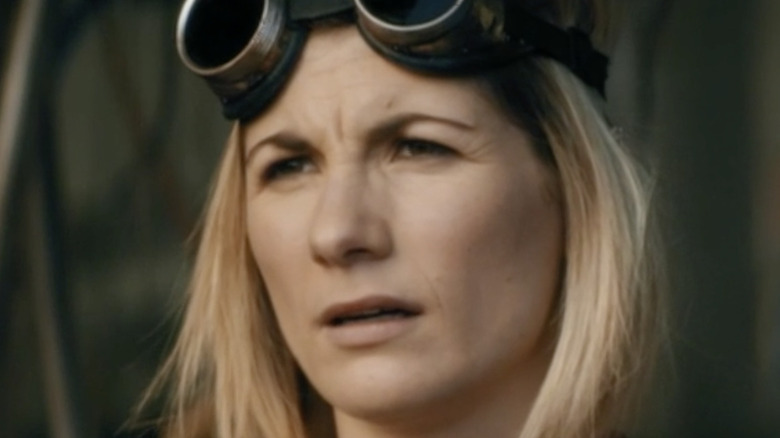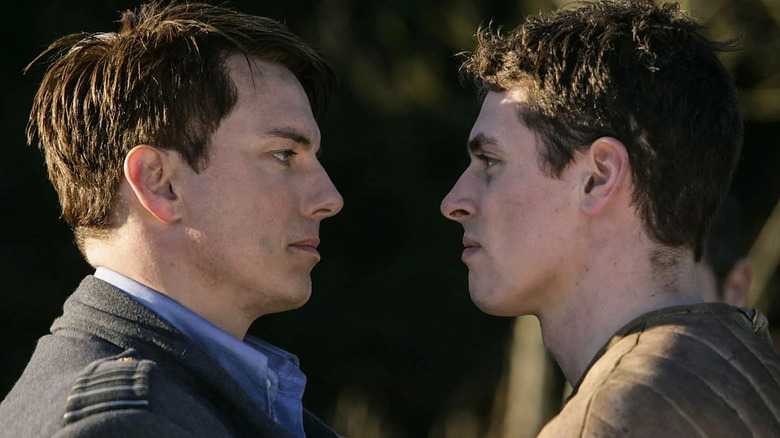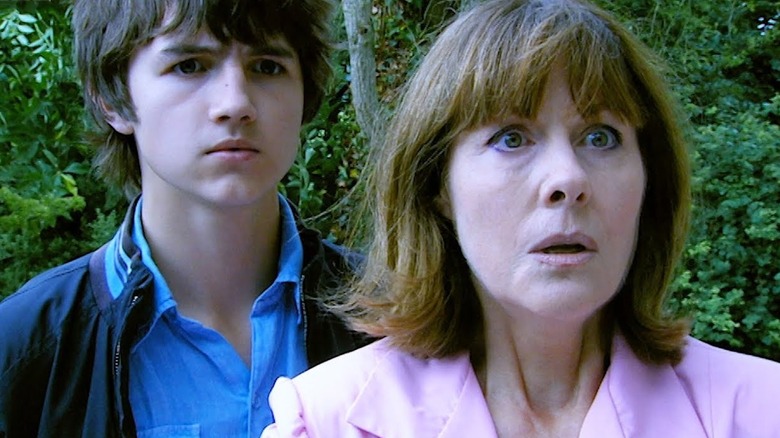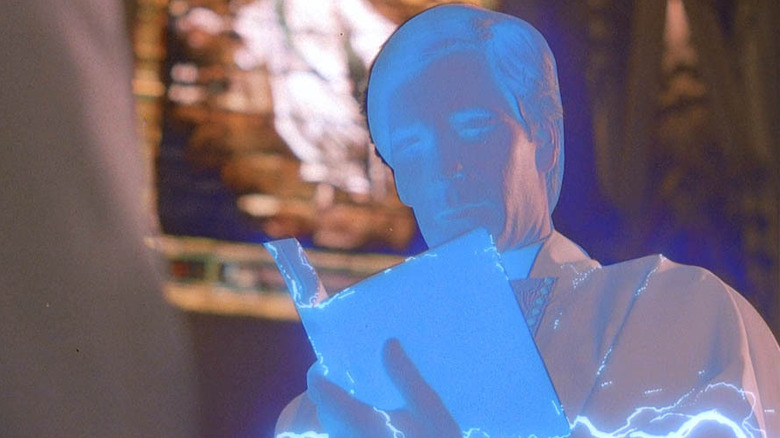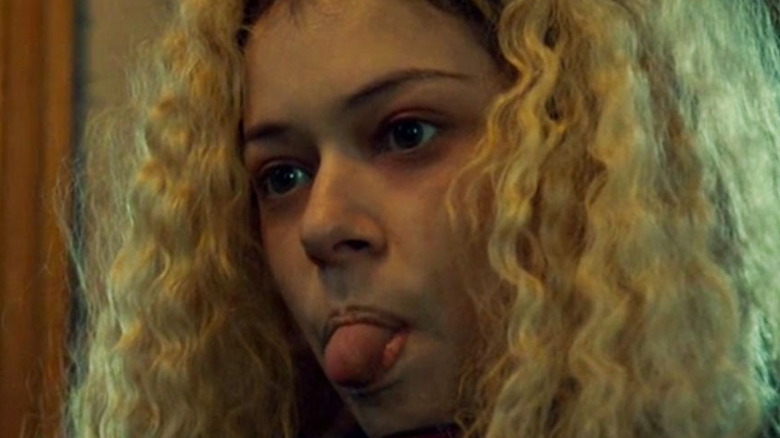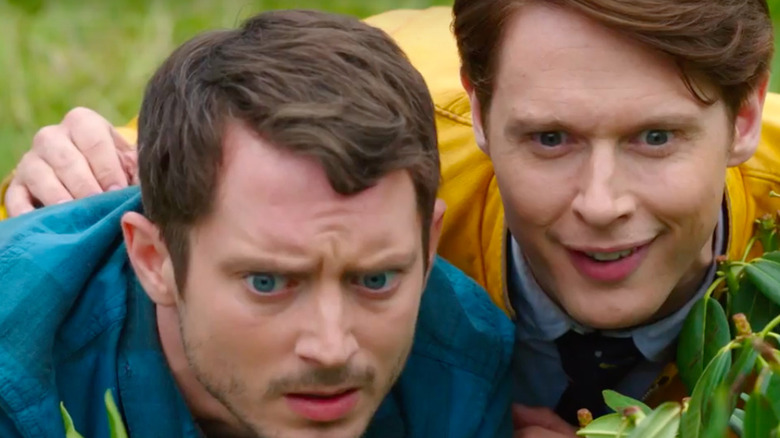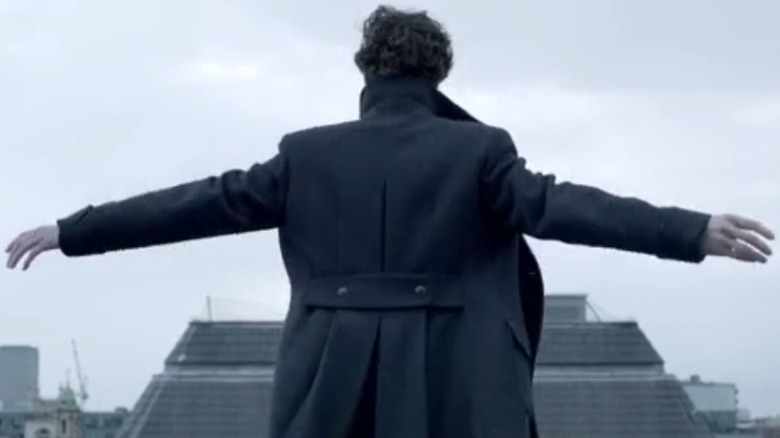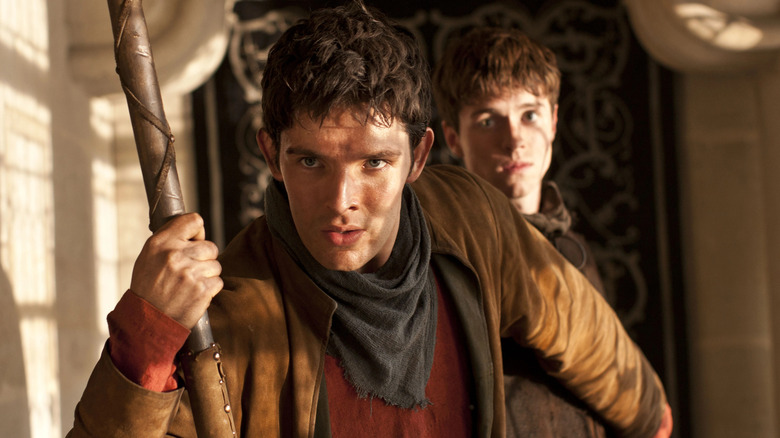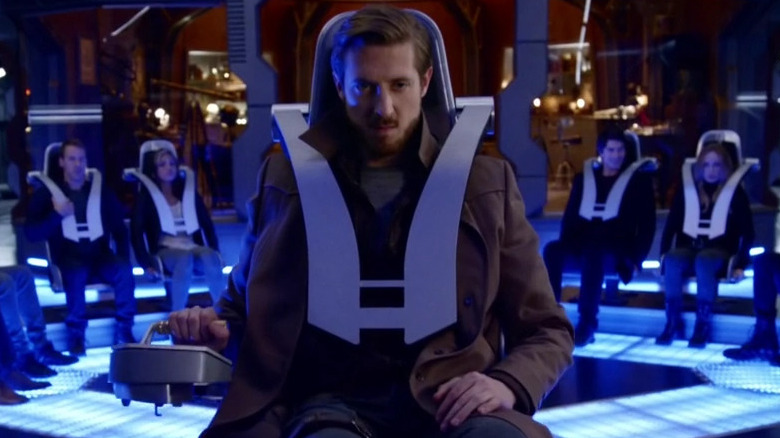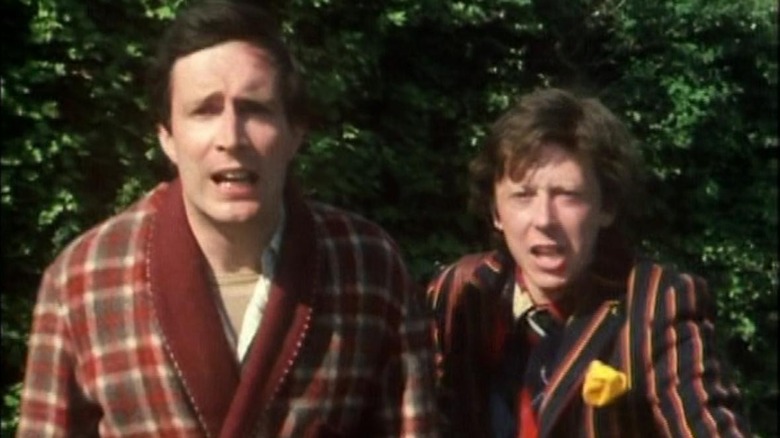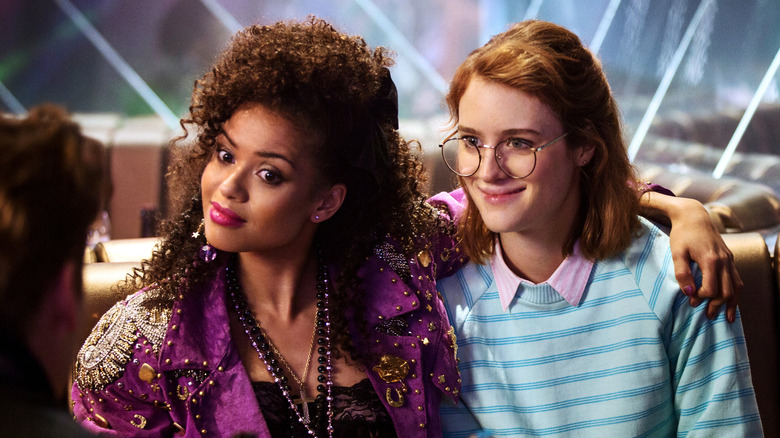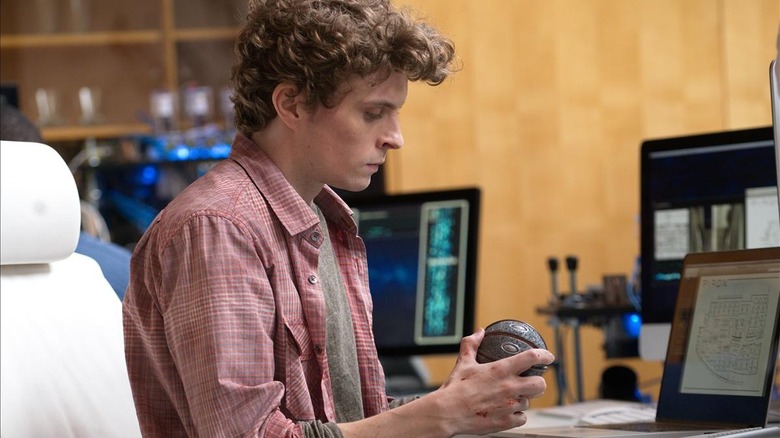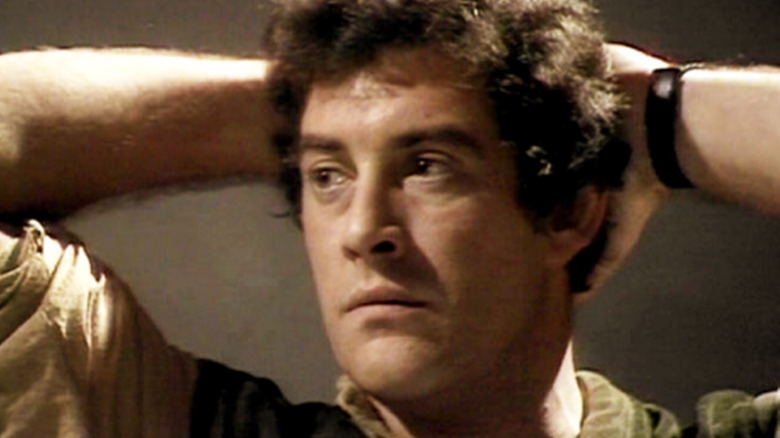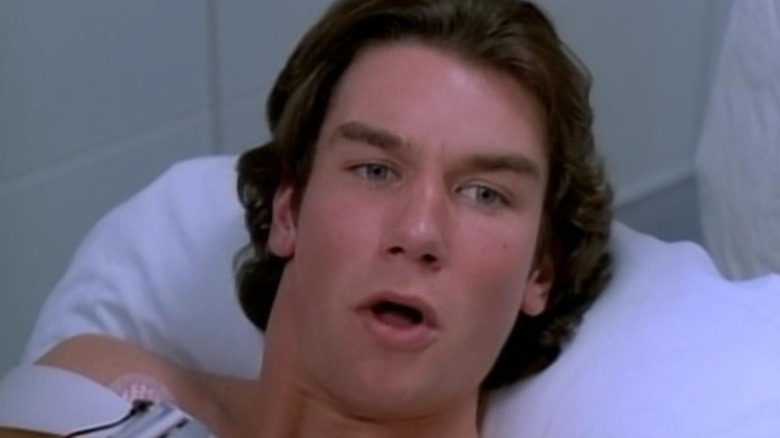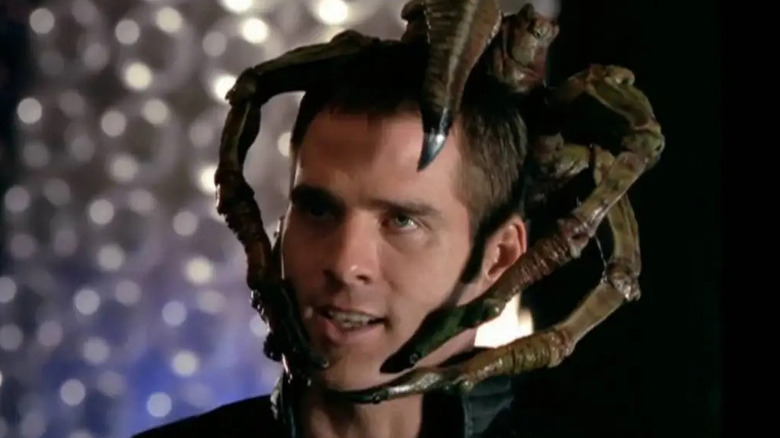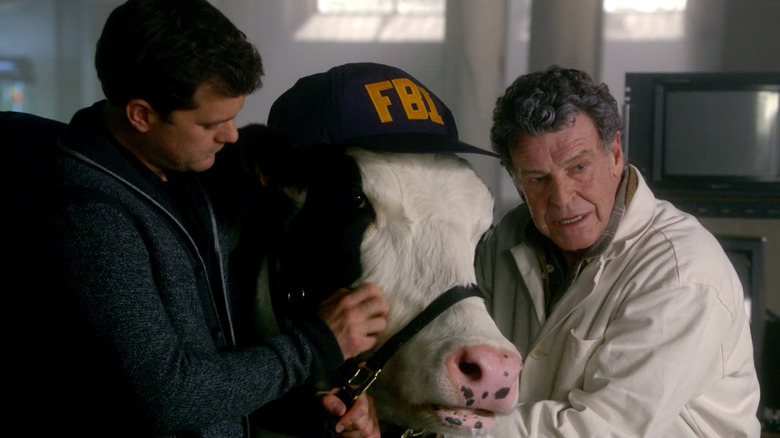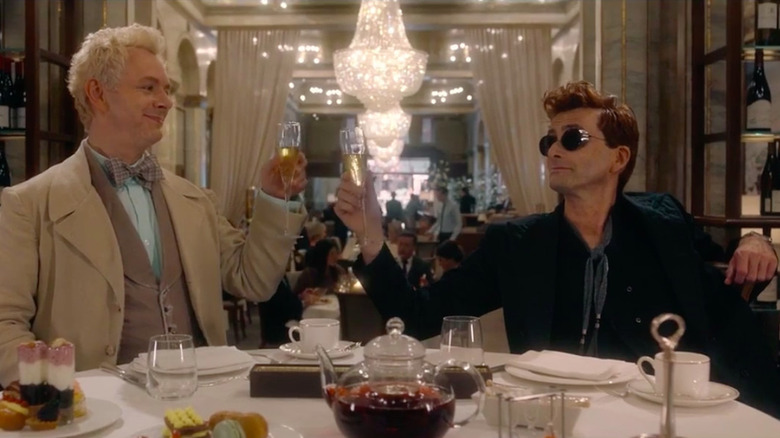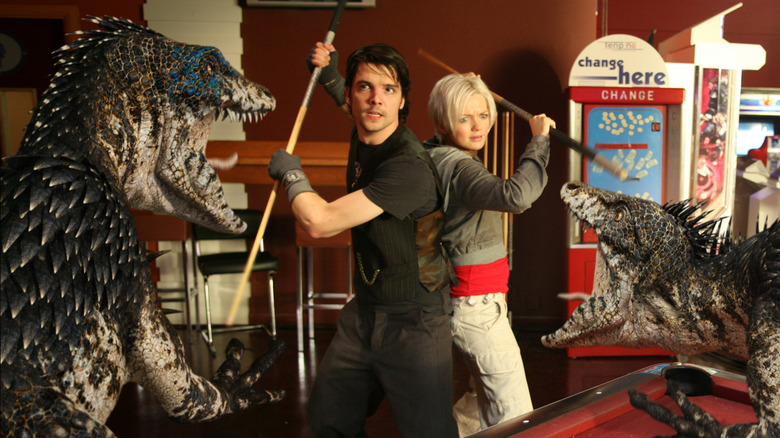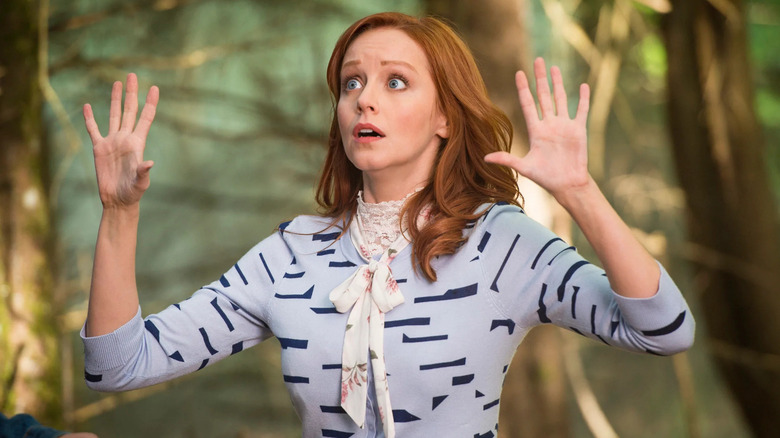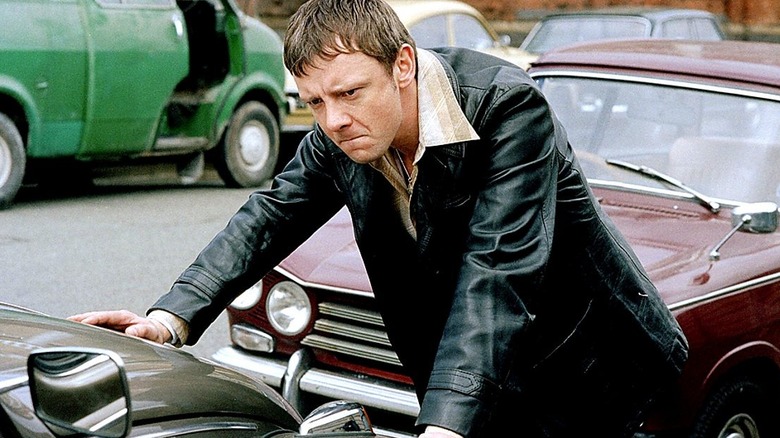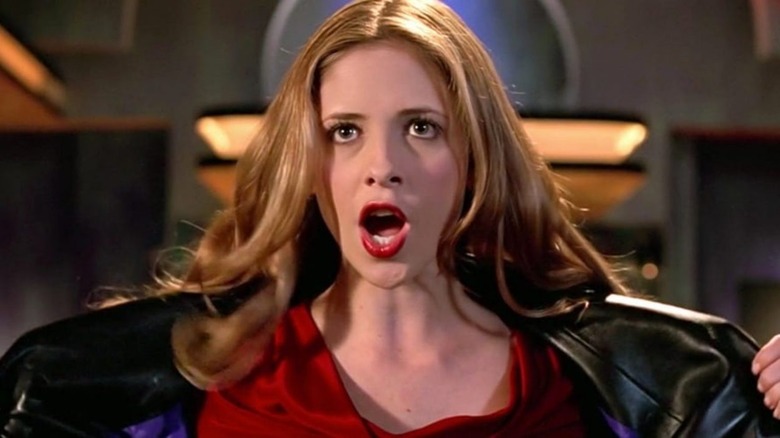20 Shows Doctor Who Fans Should Watch
There are a lot of ways to describe the long-running cultural phenomenon that is "Doctor Who" – by which, we mean both the original series nicknamed "Classic Who" and the modern relaunch nicknamed "New Who." It's a quintessentially British science fiction saga. It's a quirky adventure comedy. It's an occasionally very dark and poignant space opera about a rogue time-traveler who stole a TARDIS (that's "Time and Relative Dimension in Space") to journey through history and the cosmos. It's a witty, fast-paced program full of genuine social commentary. It's an earnest, heartfelt, family-friendly drama. The list goes on. In a nutshell, "Doctor Who" depicts the larger-than-life adventures of our extraterrestrial protagonist and their usually human companions. Thanks to the plot device of Time Lord regeneration, which contributes to the show's incredible longevity, we've enjoyed decades of material set in the rich and expansive Whoniverse with multiple actors portraying the Doctor in different incarnations — from the First Doctor, played by William Hartnell, to the Thirteenth Doctor, played by Jodie Whittaker.
Due to the show's notorious production schedule, Whovians often find themselves without any "Who" in their lives for long stretches. And considering the most recent era is nearing its end, with both Whittaker and showrunner Chris Chibnall slated to bow out before the end of 2022, we foresee quite an extensive dry spell in our future.
But don't fret. Whether you're searching for something to fill the void before this year's "Doctor Who" specials, or just looking for shows with a similar vibe, there's no shortage of content. Here's a list of 20 shows "Doctor Who" fans might consider checking out.
Torchwood
"Torchwood," an official spin-off of "Doctor Who" created by former and soon-to-be-returning "Who" showrunner Russell T. Davies, follows the adventures of flirty time-traveling con man and alien hunter Captain Jack Harkness (John Barrowman) and his small group of colleagues. Initially, the Cardiff-based ensemble operates out of the Torchwood Institute — a secret organization founded by Queen Victoria in the "Doctor Who" episode "Tooth and Claw." Basically, the group is tasked with defending humanity from both extraterrestrial and terrestrial threats while scavenging alien tech they might be able to co-opt for their own use. Considering Jack has always been more open about his moral ambiguity than the Doctor, this show's storylines are often a little darker and edgier than those of its predecessor, particularly in the first and third series. Digital Spy describes the show as one "powerful human drama" and considers the third series to be full of "magnificent writing" and "five of the most compelling hours of British science fiction."
Like its parent program, "Torchwood" has its own expansive world of literature, webcasts, radio plays — you name it. It also features notable guest stars, like the wonderful James Marsters from "Buffy the Vampire Slayer." With all that in mind, we'd say this one's worth a gander, but not until after you watch the modern "Doctor Who" episode, "Doomsday."
The Sarah Jane Adventures
Another Russell T. Davies-created "Doctor Who" spin-off, "The Sarah Jane Adventures" centers on former companion and investigative journalist Sarah Jane Smith (Elisabeth Sladen) along with her adopted son Luke (Tommy Knight), their neighbor Maria (Yasmin Paige), her friend Clyde (Daniel Anthony), a sentient supercomputer called Mr. Smith (Alexander Armstrong), and good-old K9 — the lovable robot-dog gifted to her by the Doctor. Sarah Jane and her crew unravel various mysteries, strange events, and alien occurrences happening near their home in Ealing, London.
Davies conceived of the show after the children's division of the BBC expressed interest in a series featuring the Doctor during their younger years. And considering the ever-popular Sarah Jane spans the tenure of the Third Doctor (Jon Pertwee) and the Fourth Doctor (Tom Baker) during the "Classic Who" era, and then reprises her role in a few "New Who" episodes, we'd say this show was the perfect counter to the network's initial idea. What's more — if you're a "Doctor Who" superfan with young kids who can't yet handle some of the darker aspects of "Doctor Who," "The Sarah Jane Adventures" offers up more kid-friendly storylines.
When you finish the series, which concluded after Sladen's untimely death, we'd recommend viewing the mini-webcast episode "Farewell, Sarah Jane" — essentially a tribute to both the actor and this long-running, fan-favorite companion.
Quantum Leap
In the American science fiction classic "Quantum Leap," Dr. Sam Beckett (Scott Bakula), a physicist who's determined to prove time travel is possible, faces losing all his government funding when years tick by without any tangible progress. In a desperate act, he decides to use himself as a test subject — and is promptly thrust back in time. Waking up in the past, he finds his consciousness trapped in someone else's body. So, the good news is time travel is possible. The bad news is the reality of time travel isn't what Sam expected. The even worse news is he's forced to leap from person to person and time to time with no end in sight.
Aided by a hologram of Admiral Al Calavicci (the late Dean Stockwell) and a supercomputer called Ziggy, Sam soon learns the only way out of his predicament is to start rectifying history or, as the opening narration explains, "put right what once went wrong" in hopes that "his next leap will be the leap home."
Similar to the Doctor — particularly the Eleventh Doctor (Matt Smith), who's constantly miscalculating his travel coordinates — Sam never really knows where he'll find himself next; he just knows wherever he ends up, something needs fixing. Just like "Doctor Who," "Quantum Leap" offers a fun and heartfelt ride full of social commentary. Coincidentally, NBC is currently tinkering with a possible reboot of the series, so this isn't the worst time in history to check out the original.
Orphan Black
Folks who find the Doctor's various iterations fascinating might consider checking out Canadian science fiction drama, "Orphan Black." This five-season narrative begins when Sarah Manning (Tatiana Maslany), a young British con artist, witnesses the suicide of someone who looks exactly like her at a train station. Sarah takes advantage of the tragedy and the striking likeness by impersonating the other woman long enough to empty her doppelganger's bank accounts. But when Sarah learns the deceased was a suspended police detective, she falls into a dark web of illegal human experimentation. Soon enough, Sarah discovers that she has a slew of clone "sisters" living throughout the world. With the help of her foster family, the police detective's former partner, and a few of her clones, Sarah begins to unravel the mystery of their existence, as well as the murderous plot against them.
While the Doctor is played by different actors at different times during the decades-long run of "Doctor Who," the Emmy award-winning Maslany portrays all of Sarah's "sister" clones. What's riveting here is that each of those performances is remarkably unique, in much the same way each incarnation of the Doctor brings different traits to the table.
And if you love "Orphan Black," you'll have the sequel series recently greenlit by AMC to look forward to.
Dirk Gently's Holistic Detective Agency
Think of "Dirk Gently's Holistic Detective Agency" as "Doctor Who" meets "The Hitchhiker's Guide to the Galaxy" with a healthy sprinkling of "Sherlock" thrown in for good measure. Douglas Adams, who wrote the original "Dirk Gently" novel series, also penned "Hitchhiker's Guide," and even wrote a bit for "Doctor Who" back in the day. If you're still not intrigued, let us add that this quirky and criminally under-watched gem, which only lasted two seasons, co-stars "Lord of the Rings" alumnus Elijah Wood.
Dirk Gently (Samuel Barnett) identifies as a "holistic detective," dealing with cases that involve the interconnectivity of everything. He recruits the aid of depressed bellhop Todd (Wood) and resolute security officer Farah (Jade Eshete). Todd isn't too thrilled about getting thrust into the chaos of Dirk's life, especially when he discovers that Dirk doesn't solve mysteries through traditional means. Rather, this brilliant but seemingly unhinged man waits for fate to give him the answers he needs — a strategy that gets our characters into quite a few sticky and bizarre situations.
While all this is going on, Dirk tries to avoid the secret CIA operation "Project Blackwing," which seems to play an ominous role in his past. On top of all that, the sociopathic "holistic assassin" Bart Curlish (Fiona Dourif) is determined to hunt the detective down, convinced the universe wants her to murder him. Life only gets wackier from there.
Sherlock
The modern-day Sherlock Holmes (Benedict Cumberbatch, aka Marvel's Doctor Strange) lives in London, helping law enforcement and government officials solve crimes in an unofficial capacity. At the start of the series, he happens to be looking for a flatmate, which he finds in Afghanistan War veteran Dr. John Watson (Martin Freeman). Their relationship evolves from flatmates to colleagues and friends, with Watson finding himself thrown into several complicated but intriguing mysteries.
Sure, "Sherlock" is more of a crime and mystery show than a science fiction saga. But in an interview with the Guardian, former "Doctor Who" showrunner and "Sherlock" co-creator Steven Mofatt explains that "'Sherlock' is 'Doctor Who' but an hour later in the TV schedule." Basically, it's more adult than "Doctor Who," but probably not too adult for most of the Whovian audiences. In fact, the Doctor and Sherlock are so alike — they're both exceptionally clever, eccentric, often arrogant, and fond of fast-paced dialogue — that Reddit user u/DemonicStrawberry wonders which one of them would win in a battle of wits.
Merlin
Loosely inspired by Arthurian legends, the BBC's "Merlin" launches its story with a teen version of the famous warlock (Colin Morgan) venturing into Camelot to study and work under the guidance of court physician Gaius (Richard Wilson). Trouble is, due to a radical hatred for sorcery, King Uther Pendragon (Anthony Head) banned all magic two decades prior. Poor Merlin only learns of the ban — and the necessity of keeping his own magic secret — after witnessing a public execution. While Merlin has all the reason in the world to flee the kingdom, an imprisoned dragon calls to him, insisting his destiny is intertwined with King Uther's son, Arthur (Bradley James).
Not long after, Merlin saves Prince Arthur's life, and is awarded with a job as the prince's manservant. Though this puts their destinies into motion, neither boy cares for the arrangement. But over the course of the series, their legendary bond solidifies as they join forces to protect Camelot from various threats.
In response to Reddit user u/bpr67 asking for recommendations for other shows like "Merlin" that are just as "refreshing" and "wholesome," several redditors suggest "Doctor Who." And though "Merlin" leans more toward fantasy than science fiction, we wholeheartedly agree. The series definitely matches "Doctor Who" in tone, offering the same blend of humor, wit, and adventure. In addition, both shows are capable of tremendous sadness and darkness.
DC's Legends of Tomorrow
"Legends of Tomorrow" features an ensemble of characters with roots in DC comics. It's also, in our opinion, the American superhero equivalent of "Doctor Who." IGN describes the show as "a rousing science fiction adventure" with "a very 'Doctor Who' quality" and suggests that its "Who"-like tonal direction may have played into the decision to cast Arthur Darvill — who Whovians recognize as Rory Williams — as Time Master Rip Hunter.
Hailing from a dystopian future in which the ruthless and immortal Vandal Savage (Casper Crump) took over the planet, Rip gathers a group of modern-day, super-powered folks in an effort to prevent that bleak reality from ever coming to pass. Rip's "Legends" are a mixed bag of heroes and villains (from the show's fellow Arrowverse programs "The Flash" and "Arrow"), and this crew of misfits soon find themselves traveling through time aboard a stolen ship called the Waverider (which is kind of like a TARDIS), working to protect the timeline from aberrations and prevent a devastating future.
"Legends" suffers some initial growing pains, but like "Doctor Who," the series has gone through significant changes throughout its tenure. It's had different protagonists, different villains, and storylines that go in vastly different directions than Season 1. The A.V. Club points out that "Legends" eventually embraces its silliness and becomes a sharp "metafictional comedy." All in all, we'd say this one's a solid option for any Whovian looking to fill the void during one of those frustratingly long waits for new "Who" episodes.
The Hitchhiker's Guide to the Galaxy
We're not talking about the 2005 movie starring Martin Freeman and Zooey Deschanel; we're discussing the BBC's 1981 television adaptation of Douglas Adams' "The Hitchhiker's Guide to the Galaxy."
In this version of the story, Simon Jones stars as the ever-misfortunate Homo sapien Arthur Dent, who starts his journey as an intergalactic hitchhiker by watching both the destruction of his home and the destruction of Earth. On the same occasion, he learns his friend Ford Prefect (David Dixon) is actually an alien, not a struggling actor.
This flippant obliteration of our planet and concurrent mass murder occurs because someone with a lot of power decided Earth needed to get out of the way to make room for a hyperspace bypass. But at least Arthur and Ford manage to flee Earth before they're toast. Wacky shenanigans in which the pair of friends, along with a cast of additional colorful characters, traverse space and time ensue.
With Adams at the helm, it's not hard to see why there are very "Doctor Who"-like elements throughout the show. In fact, a few Reddit users believe these two series exist in the same universe. If you find yourself enraptured, rejoice in knowing there's a new television adaptation of "Hitchhiker's Guide" in development.
Black Mirror
Inspired by shows like classic science fiction staple "The Twilight Zone," Charlie Brooker's dark anthology series explores our fears and anxieties regarding humanity's relationship with ever-advancing technology. Most of these episodes are set in a near-future, where some form of tech has fundamentally changed our lives. In one story, people are able to view their memories as if they're old home videos; in another, an expansive virtual reality network allows its aging inhabitants to exist in different time periods. Not unlike "Doctor Who," the narratives in "Black Mirror" are full of social commentary.
This one's worth a watch for adult Whovians out there, but we advise putting any children to bed first, due to the substantial quantity of nightmare-inducing sights and sounds in "Black Mirror." Redditor u/JDCarpenter91 observes that "'Black Mirror' episodes are like 'Doctor Who' episodes where the Doctor isn't around to help."
It's also worth pointing out that Jodie Whittaker herself appears in the first series of the anthology. Other notable "Black Mirror" guest actors include Miley Cyrus, Daniel Kaluuya, and Anthony Mackie.
Continuum
As the Tenth Doctor tells us in the episode "Blink" — the striking narrative that introduces the terrifying, panic-inducing Weeping Angels — "time is ... like a big ball of wibbly-wobbly, timey-wimey ... stuff." It's not a particularly eloquent quote, but it's one of the Doctor's most famous, and the point of it is clear; even for a time traveler — perhaps especially for a time traveler — time travel is confusing and chaotic.
But if you're one of those folks who finds the messy details of time travel, paradoxes, and alternate timelines utterly fascinating, then Simon Barry's Canadian science fiction series "Continuum" is for you. Basically, this is another great TV show all about time travel.
This series, which lasted for four seasons airing from 2012 to 2015, follows Kiera Cameron (Rachel Nichols), a Vancouver officer of the law living with her husband and son in the year 2077. In Kiera's time, corporate oligarchs rule the world, employing creepy "Big Brother"-style surveillance to control the people and maintain power. While in pursuit of a group of freedom fighters, Kiera finds herself thrust back in time — to the year 2012 — along with her suspects. Stranded in the past, Kiera must work with the Vancouver Police Department, Detective Carlos Fonnegra (Victor Webster), and teen genius Alec Sadler (Erik Knudsen) — who happens to be a notable figure in the dystopian future — to track down the Liber8 freedom fighters and find a way back home.
Blake's 7
From famed "Doctor Who" writer and Dalek creator Terry Nation comes the space opera "Blake's 7," which ran from 1978 to 1981. Set in a dystopian future where humans live on Earth as well as several colonized planets, the narrative follows a group of rebels fighting against a vicious totalitarian regime called the Terran Federation that uses extreme tactics to keep its citizens in check.
We're not just talking about a strict police state with high levels of surveillance; we're talking brainwashing and chemical control. The Guardian describes the first episode as "a procedural drama about a fascist state framing a political dissident for child molestation" that launches a story in which our lead, Roj Blake (Gareth Thomas), is an "innocent man fighting against the system" with a crew (the rest of the titular seven) consisting of "bona fide villains and outlaws."
Like "Doctor Who," "Blake's 7" features a stolen spaceship (this one's called Liberator) and different main characters throughout its run. Nation himself dreamt of a "Doctor Who" and Blake's 7" crossover featuring Daleks, and respective leads Thomas and Tom Baker imagined their characters crossing paths. Sadly, neither event came to pass. Still, some fans, like Reddit user /u/HopeAuq101, accept a head canon in which the two shows take place in the same shared universe. For that reason, this one's worth a watch for fans of "Classic Who" in particular.
Sliders
The 1995 American science fiction series "Sliders" was created by Robert K. Weiss and Tracy Tormé and originally starred Jerry O'Connell and John Rhys-Davies. "Sliders" managed three seasons on Fox before cancellation and then lasted two more seasons on the Sci-Fi Channel, currently known as SyFy.
Grad student Quinn Mallory (O'Connell) and his fellow sliders use an interdimensional wormhole he accidentally opens with his untested new invention – essentially a timer device that creates portals to other dimensions — to flee from danger in the first episode. This act leads the group straight into a parallel universe. Unfortunately, while the timer is meant to return them to their own reality, it lacks the correct coordinates, forcing the sliders to jump to parallel Earths at random, hoping to eventually arrive home. Their quest to go home leads the sliders to worlds with altered histories, still-existing dinosaurs, and even one timeline in which Quinn is patient zero for a devastating epidemic.
In the same way that the Doctor stumbles into meddling with the affairs of other worlds, so do the sliders. Inverse goes so far as to describe this "criminally under-watched science fiction classic" as "'Doctor Who' without the TARDIS," claiming that "Even when 'Sliders' failed hard, it was still imaginative, fun, and unique." Isn't that what we also love about "Doctor Who"?
Farscape
Think of "Farscape" as "Doctor Who" meets "Star Wars" meets the Muppets. Like "Doctor Who," it's capable of great sadness and great silliness. Also like "Doctor Who," this Australian-American science fiction series offers its viewers an expansive and unwieldy universe.
American astronaut John Crichton (Ben Browder) gets sucked into a wormhole and finds himself in a bizarre corner of the galaxy, aboard a living biomechanical spaceship called Moya (the "Farscape" equivalent of a TARDIS). The way the timing works out, John arrives just as Moya and her fellow fugitives are fleeing a dangerous and corrupt military force known as the Peacekeepers. "Farscape" only gets weirder from there.
Redditor u/TerraAdAstra has a whole list of comparisons between "Doctor Who" and "Farscape," noting that both shows include "witty ... dialogue" and "clever fish-out-of-water-type characters," as well as "episodic" narratives that "[tell] a larger story." Responding to that same thread, Reddit user u/bondfool believes that, while ""Farscape" is willing to go to darker places," the two shows are "kindred spirits."
The show only lasted four seasons before its abrupt cancellation, ending on a frustrating cliffhanger that puts the fate of some main protagonists in question. Luckily, the miniseries, "Farscape: The Peacekeeper Wars" helps wrap up that questionable ending and brings the story to a more natural and satisfying conclusion.
Fringe
The J. J. Abrams-created "Fringe" introduces us to the FBI's Fringe Division, a unit tasked with handling cases that involve "fringe science." Basically, if there's something like a technological singularity related to the matter at hand, then it falls under their jurisdiction. The series features whimsical, occasionally heartbreaking narratives that build a rich mythology and occasionally involve parallel universes, quite like "Doctor Who."
The Fringe Division even has its very own mad scientist in Dr. Walter Bishop (John Noble), who's very reminiscent of the Doctor. Walter is brilliant and generally well-intentioned. But as we learn over the course of the series, his past is littered with dark secrets and terrible deeds, many of which resulted in devastating consequences. In the same way the companions the Doctor leaves behind often struggle in the aftermath of their time-traveling adventures — if they even survive their time-traveling adventures — characters like Agent Olivia Dunham (Anna Torv) and Walter's son Peter Bishop (Joshua Jackson) suffer in the aftermath of Walter's destructive decisions. With a tragic figure like Dr. Walter Bishop at its core, we'd say "Fringe" is more than worthy of this list.
Good Omens
"Good Omens" stars David Tennant and is the brainchild of Neil Gaiman, who penned "Doctor Who" episodes "The Doctor's Wife" and "Nightmare in Silver." Obviously, there's no shortage of "Doctor Who" connections attached to this Amazon Prime series.
Truly, Gaiman's television adaptation of the 1990 novel he co-wrote with Terry Pratchett is worth watching for anyone who wants to see more of the insanely charismatic Tennant. The erstwhile Tenth Doctor just happens to share some incredible chemistry with co-star Michael Sheen. Better yet, Polygon reports that there are plenty of "Doctor Who" Easter Eggs for the eagle-eyed Whovian to spot.
Tennant plays a demon named Crowley, who lives on Earth as a sort of representative-ambassador for hell and shares a deep friendship with the bowtie-wearing angel Aziraphale (Sheen), despite their respective allegiances.
In 2018, there's trouble on the horizon. Turns out their pleasant lives on Earth are about to be disrupted by the coming of the antichrist, signaling that the end-times are near. And so, the two unlikely friends embark on a journey to try to prevent the planned devastation and maintain their lifestyles. Unfortunately, other agents — of both Heaven and hell — are equally determined to bring about Armageddon, and actively work against Crowley and Aziraphale.
Primeval
If you're a fan of "Doctor Who" episodes like "Invasion of the Dinosaurs" from the classic era or "Dinosaurs on a Spaceship" from the modern era, then you'll likely enjoy "Primeval."
in "Primeval," prehistoric creatures venture into our world via a phenomenon the show calls "earthquakes in time." As such, Professor Nick Cutter (Douglas Henshall) — along with a small team consisting of a friend, a student, and a zookeeper — have a lot on their plate. They have to make sense of these bizarre anomalies, defend themselves in particularly dangerous situations, and attempt to return these creatures to their times. During these insane adventures, Cutter also discovers the truth about his long-presumed dead wife.
There's no time-traveling extraterrestrial protagonist on "Primeval," but there is a lot of time travel. And just like Rory Williams is ripped away from Amy Pond (Karen Gillan) and erased from time in "Cold Blood," one character suffers the same devastating fate in "Primeval." Like Amy, many of the other characters don't remember the person in question, but Cutter does, and must deal with the weight of that knowledge.
Notably, there was even a bit of a rivalry between "Doctor Who" and "Primeval." The BBC apparently considered the two shows to be too alike to share the same network, which is a real shame.
The Librarians
"The Librarians" is an adventure comedy gem that leans more toward fantasy than science fiction, but the situations that occur can be just as somber and devastating as the ones faced by the Doctor and their companions. Here, the eponymous Librarians are part of an ancient organization tasked with protecting the world from magical threats. While there is initially only one Librarian — at the start of the series, it's Flynn Carsen (Noah Wyle) – things get so dire that The Library decides to recruit three more Librarians to help carry the responsibility.
Created by John Rogers, based on David Titcher's novel of the same name, and serving as a direct spin-off of the film series, "The Librarians" sends out major "Doctor Who" vibes. We've deemed it more than acceptable for this list.
In fact, according to Tor, this series is "arguably the closest thing American genre TV has to 'Doctor Who,' at least in terms of heart and worldview." The outlet goes on to compare the character of Flynn to the Doctor, calling him "brilliant, heroic, eccentric, and in love with his job. But ... also arrogant, self-centered, willfully obscure, and obsessed with his job. He's a survivor, and a surprisingly poignant one."
Sounds exactly like our Doctor, no?
Life on Mars (UK)
The British series "Life on Mars" centers on Detective Sam Tyler, played by John Simm, most recognizable to Whovians as the Master from the Tenth Doctor era. Not only that, "Doctor Who" showrunner Chris Chibnall wrote a couple of "Life on Mars" episodes during the show's two-series run. This one's worth a watch, just for those two notable facts.
"Life on Mars" begins in 2006, and promptly relocates to 1973 after our protagonist is hit by a car. In the '70s, Sam keeps doing policework while trying to make sense of whether he really did travel back in time, or if he's lying in a coma somewhere, or if he's actually dead and residing in some off-kilter afterlife. "Life on Mars" isn't too concerned with clarity, and it keeps its audience just as uncertain as Sam regarding the truth of the matter. But that ambiguity is all part of the charm and the fun, especially for people who enjoy mystery box-type shows.
If you enjoy "Life on Mars," but also want some answers, you might consider checking out the sequel series, "Ashes to Ashes." While it doesn't feature Simm, it will give you more insight into his experience and what's actually going on.
Buffy the Vampire Slayer
"Buffy the Vampire Slayer" may seem like the odd one out on this list, but it's no secret that once and future "Doctor Who" showrunner Russell T. Davies is a huge fan of the groundbreaking 1996 horror-themed coming-of-age classic. He mentions as much in many interviews, including one with the A.V. Club. We can see that "Buffy" influence throughout the 2005 relaunch "New Who" era originally helmed by Davies, via witty, fast-paced dialogue, social commentary, and rich character growth. Things are frequently dire for the characters of both shows, and the narratives in each can get pretty dark. Ultimately, even Anthony Head — who plays Rupert Giles on "Buffy" and Brother Lassar in the 2007 "Doctor Who" episode "School Reunion" – believes "Doctor Who" owes "Buffy" a debt. If Giles thinks so, well ... there's really no arguing.
Rather than an immortal time-traveler armed with a sonic screwdriver, the power of regeneration, and other unique talents (like the Eleventh Doctor's ability to communicate with horses and babies), this legendary series centers a blonde teen vampire slayer with superstrength, accelerated healing, and a duffel bag full of stakes and crosses. While the Doctor traverses all of space and time, Buffy's stuck fighting demons and vampires and diverting apocalypses while trying to survive high school in Sunnydale, California.
